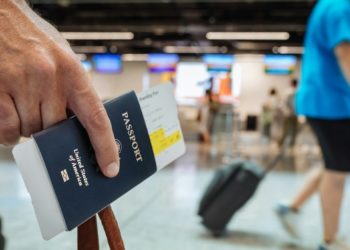Following Brexit and the growing flow of people to and from the Schengen area, new regulations are popping up that travelers from abroad need to be aware of, and some of those are set to go into effect in 2025.
You May Need Pre-Travel Authorization in 2025
Beginning in 2025, travelers from visa-exempt countries will be required to apply for pre-travel authorization before visiting any of the 29 countries in the Schengen area. This new ordinance will impact British travelers, as well as those with US nationality, Canadian, and others.
This authorization, called ETIAS (European Travel Information and Authorization System) is much like the USA’s ESTA system. Before traveling abroad to any country in the Schengen Area, travelers will need to visit the official ETIAS website to apply.
On the official site, travelers will fill out a form with a few personal details, such as their passport number, name, and nationality. Additionally, they’ll be required to share some demographic information, including their current profession and highest level of education.
Once this section is complete, applicants will then pay a €7 application fee and can submit their application for review. Insurte.com, a company specializing in Schengen visa insurance, reports that in most cases, approval should happen in just a couple of minutes. However, approval could take up to 30 days in some cases. Authorization is digitally linked to your passport.
Border Control May Look Different
Non-EU citizens are required to pass through border control to enter any country in the Schengen area (at their first point of entry). To date, border control has been a sometimes cumbersome process for travelers, with long lines and wait times. This changes with the implementation of EES, or the Entry/Exit System.
EES is a new border management system that modernizes how foreign travelers enter and exit the Schengen Zone. It is designed to replace the manual process of waiting in line to have your passport stamped.
At certain border crossing points, self-service systems may be available for travelers. The EU claims that this automated process will help make border checks more efficient by reducing the time needed for manual review. Here, the date and location of entry will be recorded
Some Countries are Changing Their Rules for Travelers
The Schengen area as a whole isn’t alone when it comes to new policies. We’re seeing country-specific statutes being established that impact non-EU citizens.
For example, a new regulation in Spain just went into effect, requiring tourists to share several personal details to rent short-term accommodations or motorized vehicles. Italy recently banned self-check-in for all Airbnbs. Greece is raising its tourist tax. Travelers need to pay close attention to new requirements ahead of their trips.
Bulgaria and Romania Have Joined the Schengen Area
For anyone planning to travel to Bulgaria or Romania in 2025, travelers should note all of the policies above (and any others that already apply to the Schengen area, such as visa requirements for citizens of non-exempt countries).
For travelers preparing for extended trips to the Schengen Zone in 2025, organizing belongings before departure is essential. Whether you’re temporarily relocating or simply need a secure place for your valuables while abroad, utilizing storage units Sherwood Park can provide a convenient solution. These units offer a safe space for storing seasonal items, important documents or furniture, ensuring peace of mind while you embark on your journey.


![7 Best POS Software in the UK [2026 Edition]](https://todaynews.co.uk/wp-content/uploads/2026/02/7-Best-POS-Software-in-the-UK-2026-Edition-360x180.png)










































































